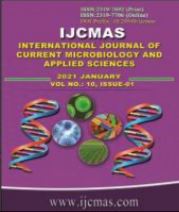


 National Academy of Agricultural Sciences (NAAS)
National Academy of Agricultural Sciences (NAAS)

|
PRINT ISSN : 2319-7692
Online ISSN : 2319-7706 Issues : 12 per year Publisher : Excellent Publishers Email : editorijcmas@gmail.com / submit@ijcmas.com Editor-in-chief: Dr.M.Prakash Index Copernicus ICV 2018: 95.39 NAAS RATING 2020: 5.38 |
A pot experiment was carried out at Zonal Agriculture Research Station, Kalaburagi (Karnataka), during kharif 2018 and 2019 to study the influence of weed management by allelopathy on nutrient status of soil in pigeonpea (Cajanus cajan L.). The soil was medium deep black with soil pH (8.13), EC (0.25 dS m-1), available nitrogen (242 kg ha-1), P2O5 (34 kg ha-1) and K2O (347 kg ha-1). The experiment was laid out in completely randomized block design which comprised of 18 treatments with three replications, consisting four plant extracts, i.e., Sorghum, Parthenium, Cassia and Eucalyptus and imazythapyre herbicide. All the practices followed were according to package of practice of UAS, Raichur. The data of each crop season were statistically analyzed. Weed management practices significantly influenced the available nutrients in soil (N, P and K) among all the treatments at harvest of pigeonpea. Imazythapyre @ 56.25 g a.i./ha + sorghum plant extract at 20-25 DAS, imazythapyre @ 56.25 g a.i./ha + cassia plant extract at 20-25 DAS, imazythapyre @ 56.25 g a.i./ha + parthenium plant extract at 20-25 DAS, imazythapyre @ 37.5 g a.i./ha + sorghum plant extract at 20-25 DAS, imazythapyre @ 56.25 g a.i./ha + eucalyptus leaf extract at 20-25 DAS, imazythapyre @ 37.5 g a.i./ha + cassia plant extract at 20-25 DAS, imazythapyre @ 37.5 g a.i./ha + parthenium plant extract at 20-25 DAS and imazythapyre @ 37.5 g a.i./ha + eucalyptus leaf extract at 20-25 DAS recorded significantly higher number of primary and secondary branches, seed yield per plant, 100 seed weight and grain yield and lower available nitrogen, phosphorus and potassium compared to rest of the treatments. Plant extracts when used with herbicide help to reduce usage of herbicide by 50 %. Soil fertility and productivity can be maintained for longer period through which crop production can become more productive, sustainable and economical both directly and indirectly.
 |
 |
 |
 |
 |